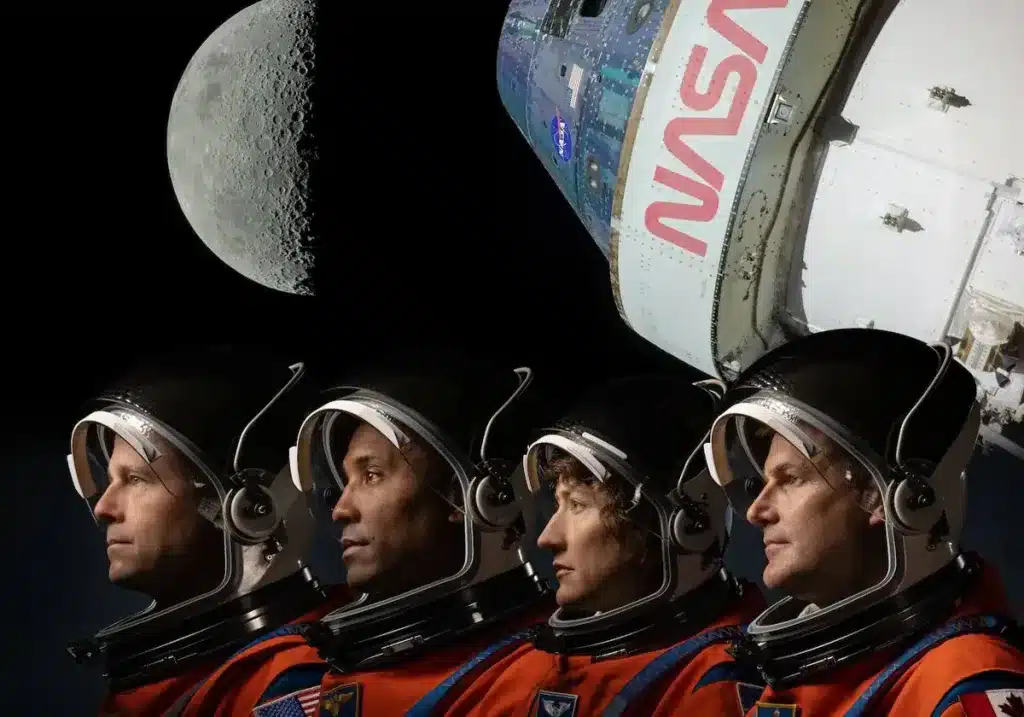Space exploration and its ethical values
What man should be satisfied with is his intelligence, which allows him to advance in the knowledge of the keys to the universe using his ingenuity

The reasons for space exploration
Space exploration is motivated by interest in scientific and technological advances, but also by an innate feeling for exploring the unknown and by geopolitical and strategic considerations. In fact, the first man set foot on the Moon in 1969, precisely for this last reason, as President Kennedy made clear a few years before: “Space exploration will continue, whether we join it or not, and it is one of the great adventures.” of all time, and no nation that claims to be the leader of other nations can expect to be left behind in this race for space.”[1]
Currently, after forty years of relative cooling, space projects are reactivated, at a time when China is trying to supplant the United States as the dominant power on Earth and has shown rapid advances in space, while the United States intends to maintain its leadership position.
This revitalization of the space race is also encouraged by other factors, such as: the emergence of private initiative in the sector, with a focus on tourism, and the extraction of resources.
Stepping on Mars is the current objective, an important challenge that would allow us to show who the world leader is, through a fundamentally emotional achievement. Buzz Aldrin, one of the three astronauts who visited the Moon for the first time, made it clear in The Guardian in 2009: “Mars for the future of the United States. I’m not suggesting a few visits to plant flags and take photos, but a trip to create the first farm in space: an American colony on a new world.”[2]
Ethical considerations
The development of these projects is already underway and the most speculative, but widely accepted, related to the colonization of the universe, have opened the logical debate on the ethical issues and moral permissibility of different technological strategies to face the rigors of travel. space and colonization.
The ethical aspects of space activities that deserve attention are numerous and of a very diverse nature. They range from the management of space waste and the protection of the environment (both on Earth and other planets), the legal status of space, its militarization or resource management and many others. But, without a doubt, actions that directly affect human beings bring to the fore the most significant ethical repercussions.
The analysis of these ethical implications leads us to differentiate between the immediate projects to be carried out, a first manned scientific mission to Mars, and the extended idea of reaching a permanent settlement with thousands or hundreds of thousands of colonists on the Red Planet.
Manned mission to Mars
NASA’s current Artemis[3] program has several flights to the Moon planned this decade, with the installation of a permanent base on the lunar surface. All of this with a view to developing the technology for a manned flight to Mars. This is how NASA Administrator Jim Bridenstine expressed himself when presenting this program: “We return to the Moon in search of scientific discoveries, economic benefits and inspiration for a new generation of explorers,” and added: “As we build a presence sustainable, we are also building momentum towards those first human steps on the Red Planet”[4].
NASA’s 2022 white paper entitled Transport to Mars[5] indicates the year 2039 as a reference for man’s arrival on Mars. There is no detailed plan for its execution, but the development of all the devices needed for round-trip transportation must be based on known technologies, so their progress can be predictable and scheduled. However, the behavior of the human body in the adverse conditions that prevail in space is unknown, and providing adequate protection may be more difficult to program.
The fragility of the human being
The Earth has a protective shield around it due to its magnetic field, the magnetosphere, which largely filters cosmic radiation. And the human body has evolved to live on Earth, with its atmosphere and specific gravity. The first step to going out into outer space must be understanding and being able to mitigate the health challenges that await us out there.
For just over twenty years, the International Space Station (ISS) has been in orbit around the Earth, which is a microgravity research laboratory and where many astrobiology experiments have been carried out. As astronomer and popularizer Bob Berman states, “the results of astronauts who have spent a lot of time on the International Space Station show good reasons to worry about the medical consequences of space travel.”[6] And this despite the fact that the Experience is very limited, since most astronauts’ stays there have been less than six months and without the real effects of galactic cosmic radiation, since the ISS orbits within the magnetosphere.
The trip to Mars confronts us with a much greater permanence in space. Even when the planets are as close as possible, the round-trip distance between Earth and Mars is about 950 times that of the round-trip distance to the Moon. Furthermore, once on Mars you have to wait for the distance to Earth to be optimal, so if Armstrong, Aldrin, and Collins’ trip to the Moon lasted eight days, the trip to Mars should last longer than a thousand days.
Outer space is an inhospitable place. Astronauts are bombarded with carcinogenic radiation, subjected to a lack of gravity, confined in small spaces and must eat a restricted diet. NASA’s Human Research Program (HRP) aims to develop and provide the knowledge base, technologies, and countermeasure strategies that enable safe and successful human spaceflight. And, for now, different high priority risks have been identified, such as: the effects of radiation, which causes the DNA of cells to break; reduced gravity, which causes human body fluids to circulate towards the head and thus put pressure on the brain and eyes, affecting vision; or mental stress resulting from isolation in a small space. Appropriate countermeasures are not available at this time, as stated in the 2022 NASA white paper: “We do not yet understand all of the mechanisms involved, or the extent to which the multifactorial causes that contribute to human system risks can limit the countermeasures that would be effective.”[7]
But the situation would be worse according to what was expressed in an article signed by researchers from different universities and organizations from different countries: “there are good reasons to assume that even the most substantial and invasive forms of biomedical improvement may be far from being sufficient.” to provide safe and efficient interstellar travel for humans.”[8]
There is pressure to speed up the process
In recent years, private investment in the space sector has developed a lot, creating growing interest in its rapid development and trying to accelerate different projects. Three well-known billionaire visionaries: Elon Musk, Jeff Bezos and Richard Branson are no strangers to this pressure. But it seems more feasible to accelerate the development of flight and landing systems than the knowledge and prevention of alterations of the human body in outer space. And this can lead to the dangers that astronauts must assume. Elon Musk has repeatedly spoken out about taking risks to speed up this process: “It’s dangerous, it’s uncomfortable, it’s a long journey. You may not come back alive. But it is a glorious adventure, and it will be an incredible experience”[9]. He has even alluded to the advertisement that Ernest Shackleton is supposed to have published in the press in the 19th century when he sought to assemble a crew for the first excursion to Antarctica and which would have received more than 5,000 responses: “Men are wanted for a dangerous voyage, little money, intense cold, long months of total darkness, constant danger, safe return, doubtful, honor and recognition in case of success.” Musk is aware that there will be no shortage of volunteers: “A lot of people will probably die” [10].
Risks have already been taken in the past, on the occasion of the first moon landing. President Nixon, aware of the dangers to which the first visitors to the Moon were subjected, had prepared the speech in the event of a fatal outcome: “Destiny has ordained that the men who went to the Moon to explore in peace will be Stay on the Moon to rest in peace. (…) Because every human being who looks at the Moon in the coming nights will know that there is some corner of another world that is forever humanity”[11].
We know that zero risk does not exist, so far 19 astronauts have died in space missions and another 11 perished during testing and training on Earth, but we must consider the ethical question of sending human beings to such a dangerous environment without the guarantee of have effective countermeasures, sufficiently tested.
A generalized idea: we must colonize Mars
In the 70s of the last century, biologists Edward Wilson and Eugene and Howard Odum published their ideas about the possibility of creating extraterrestrial colonies. A purpose that was gaining followers among the public, but also in scientific circles. And that it was adopted in 1986 by the US National Space Commission, which concluded that the long-term ambition of the US civilian program should be to “support human settlement beyond Earth’s orbit, from the highlands of the Moon to the plains of Mars.”[12]
Different reasons are argued to justify this colonization, such as science, economic opportunities and resources, inspiration and adventure. Much emphasis is placed on the long-term survival of humanity. Elon Musk is very adamant that this project is for the good of humanity: becoming a “multiplanetary species” will increase our chances of survival. This is an idea that is both utopian and morally reprehensible, since the actions required to carry out this project, according to current technology, are ethically inadmissible.
Mikko M. Puumala and other researchers from the University of Turku[13] enter this debate and recognize the value of this concept: “Protecting humanity is indeed a noble cause, and avoiding premature annihilation is widely considered extremely desirable measure. Therefore, if colonizing Mars helps us safeguard humanity, it greatly increases its moral desirability.” But they consider that it is neither a realistic objective nor the best means of avoiding the extinction of humanity. Some of the arguments they use are: we are not in a position to create a self-sufficient and sustainable settlement; some considered extinction risks, such as a pandemic or war, could affect both populations at the same time; and the cost of this project would be much more expensive than that of mitigating the risks of extinction on Earth, which in any case would continue to be home to the vast majority of the population.
Terraform Mars
Mars has long since lost its atmosphere and life on its surface is not possible for humans. To overcome this, two alternatives are proposed: what has been called terraforming Mars, that is, generating an atmosphere that allows human life on it; or genetically modify the human being to convert it into a being resistant to galactic radiation and other conditions on the surface of Mars. In reality, both things would be necessary, and both are reprehensible from an ethical point of view.
The term terraforming was introduced by Jack Williamson in 1942 in a science fiction novel. Carl Sagan was, in 1961, the “first scientist to speculate on terraforming in the pages of a technical journal”[14]. Since then, very different ideas have been published on how to achieve this goal, but observations carried out by spacecraft in the last 20 years rule out this possibility. Dr. Bruce Jakosky, principal investigator of NASA’s MAVEN (Mars Atmosphere and Volatile Evolution) project, has stated that “terraforming Mars is not possible with current technology”[15].
In any case, this intention of some remains and, given that we increasingly feel the need for an ethical relationship with our planet, we must ask ourselves if we should not think similarly with respect to the extraterrestrial environment.
Genetically modify the human being
Since the human species is not well adapted to living and working in space for long periods of time, it is proposed to artificially increase human adaptation to space by biomedical means.
But this is only possible through treatments that affect our DNA, which would have to be specifically adapted to allow a long and healthy life on Mars, including genetic adjustments for good muscle, bone and brain health. These traits should be heritable, so that Martian colonists could pass them on their offspring.
There is a current of opinion that tries to justify genetic engineering of the germ line by the need to adapt the human being to the conditions of space. An example of this is the article signed by fourteen researchers from different universities and organizations from five different countries, headed by Konrad Szocik, from the Interdisciplinary Center for Bioethics at Yale University[16]. It states that: “Some ethical considerations are relevant to issues debated on Earth, but they differ markedly when applied to the context of space missions.” The argument for accepting the use of genetic engineering would be the consideration of “preventive medicine” instead of “improvement of the species” for those humans who must survive on Mars. This gives rise to accepting that, with the passage of time, new species of astronauts and their descendants are generated that could become a species different from Homo sapiens.
This line of thinking is contrary to the consensus that has prevailed until now. The ethical debate on human gene editing (HGE) has lasted for more than 50 years, in which scientists, philosophers, theologians and other participants in it have used the somatic and germline distinction as a moral limit. “Somatic differentiation” means changing the genes of some of an existing person’s cells in a way that does not affect their reproductive cells, while “germline” means changing the genes of someone’s offspring and, ultimately, small measure, of the human species. This was stated in 1997 by the Council of Europe in the Convention for the Protection of Human Rights with respect to the Applications of Biology and Medicine: “Only an intervention may be carried out that aims to modify the human genome for preventive, diagnostic or or therapeutic and only when the purpose is not the introduction of a modification in the genome of the offspring.”[17]
And this has also been stated in the Declaration of the Organizing Committee of the Third International Summit on Human Genome Editing held in London last year: “Hereditary editing of the human genome remains unacceptable at this time”[18]. At this summit, Tina Rulli, associate professor at the University of California Davis, specializing in normative and applied ethics and bioethics, expressed herself like this: “There are a lot of serious objections to modifying the reproductive genome,” such as “concern about safety of modification, (…) the risk of dangerous modifications being loose in the human gene pool, a slippery slope towards the use of technology to create designer babies, unethical eugenic uses of technology that harm communities of disabled, and unequal access to technology that only benefits the rich.”[19]
There are very numerous philosophers and scientists whose thinking supports this limitation. Jürgen Habermas claims that any genetic interference that could change human nature should be morally prohibited, since it alters the very essence of human nature. Redesigning human beings means reducing them to objects, fundamentally evaluating the conformity of the object (or means) with an end, reasoning directly applicable to missions to space or Mars[20]. The thinker Francis Fukuyama, author of Our Posthuman Future. Consequences of the biotechnological revolution, considers that genetic improvement is never a morally acceptable solution, since those essential characteristics that support the “sense of who we are and where we are going, despite all the changes” would be lost (perhaps irreversibly). evident that have occurred in the human condition throughout history”; which leads him to conclude, regarding the idea of Mars as a refuge, that we could think about genetically enhancing and then transferring an entire population to another planet, but this would not save the human species from the risk of extinction, since people that would leave Earth would no longer belong to our species[21].
A future without astronauts
The idea that we will soon establish colonies on Mars inhabited by hundreds or thousands of people is pure nonsense and an unmitigated denial of the tremendous challenges posed by that prospect. “It is a dangerous illusion to think [as some do] that we can escape the problems of Earth by going to Mars,” says Martin Rees [22], British astronomer and one of those voices with authority in different fields of science. Lucianne Walkowicz, an astronomer at the Adler Planetarium in Chicago and a student of the ethics of Mars exploration, puts it more radically: “I think this idea of Mars as a reserve planet would be almost comical if it weren’t so sinister.”[23]
Faced with so many unrealizable projects and utopian goals, it is possible to oppose more realistic ideas that allow progress in knowledge and exploration of the solar system. Man’s ability to intervene in space does not necessarily require his physical presence in outer space. Space technology, using probes, satellites and automated devices, can in most cases be just as effective, and is often less expensive, than a manned mission. Robots are already good space explorers; and they will become increasingly intelligent in the near future.
Robotic development is destined to be more economical and effective than humans in the task of investigating outer space. Furthermore, visiting Venus or Mercury with manned spacecraft is unfeasible due to their high temperatures; and in the same way, a trip to Jupiter or the asteroid belt is impossible due to their extremely low temperatures.
“The fact is that robots are getting better and cheaper,” says Rees, “so I don’t see the huge public expense of sending people into space being justified”[24].
Perseverance, NASA’s latest explorer robot, has been on the surface of Mars since February 18, 2021. Its mission is fundamentally to detect if there are signs of life. To achieve this, it works tirelessly and has already sent many thousands of data. Led by six principal researchers, one of whom is Spanish, hundreds of scientists work daily analyzing the information received. In reality, the true “exploration” is carried out on Earth, in laboratories spread across all continents.
The robotic space program is a much more cost-effective means of advancing our scientific knowledge of the universe. Manned space exploration best satisfies our species’ spirit of epic and curiosity, but we must abstract ourselves from the epic that science fiction has breathed into our minds: telling us the kind of space adventures that people want to see and have been created for. changed reality: imagining a space small enough to be able to move around easily; crowded and noisy enough to be exciting; a place where the physics of flight works just as we see it on Earth; where the space adventure is like a maritime adventure, with planets for islands, and the opportunity to tell stories of piracy, exploration and colonialism… And surrender to the evidence: the human being is fragile in the face of the conditions of outer space.
What man should be satisfied with is his intelligence, which allows him to advance in the knowledge of the keys to the universe by making use of his ingenuity. Every time a robotic ship reveals new enigmas of the universe to us, we should feel proud, because that is the result of our intellect.
Manuel Ribes – Life Sciences Institute – Bioethics Observatory – Catholic University of Valencia
***
[1] Sebastian Gerhard Lyhne Hanssen, Aiming for the Moon The Arctic University of Norway, Master’s thesis in Political Science, STV – 3900, May 2023
[2] Buzz Aldrin, Time to boldly go once more The Guardian Thu 16 Jul 2009
[3] M. Ribes A new space race UCV Bioethics Observatory October 2022
[4] Neel V. Patel How the Artemis moon mission could help get us to Mars MIT Technology Review September 23, 2020
[5] White Paper MARS TRANSPORTATION NASA’s 2022 strategic analysis
[6] Bob Berman Will It be Safe for Humans to Go to Mars? Maybe Not. Almanac November 13, 2023
[7] White Paper MARS TRANSPORTATION NASA’s 2022 strategic analysis
[8] Konrad Szocik et al. Future space missions and human enhancement: Medical and ethical challenges – ScienceDirect Elsevier Ltd. July 31 2021
[9] Chelsea Gohd Elon Musk reminds us all that ‘a bunch of people will probably die’ going to Mars Space.com April 28, 2021
[10] Jackie Wattles Elon Musk on Mars: ‘You might not come back alive’ CNN Business, April 27, 2021
[11] James Mann The speech Richard Nixon would have given ‘in event of moon disaster’ The Washington Post July 12, 2019
[12] PIONEERING THE SPACE FRONTIER The Report of the National Commission on Space NASA 1986
[13] Mikko M. Puumala et al. Moving to Mars: The Feasibility and Desirability of Mars Settlements, Elsevier Ltd. 2023
[14] Martyn J. Fogg The ethical dimensions of space settlement, Elsevier Science Ltd. 1999
[15] Bill Steigerwald, Nancy Jones Mars Terraforming Not Possible Using Present-Day Technology. Mars Exploration Program News July 30, 2018
[16] Konrad Szocik et al. Future space missions and human enhancement: Medical and ethical challenges – ScienceDirect Elsevier Ltd. July 31, 2021
[17] Convenient for the protection of human rights and the dignity of the human being with respect to the applications of Biology and Medicine BOE 251 of 20/10/1999 Sec 1 Page 36825 to 36830
[18] Rob Stein Ethical concerns temper optimism about gene-editing for human diseases Shots – Health News : NPR, MARCH 8, 2023
[19] Ibid.
[20] Balistreri, M., Umbrello, S. Modifying the Environment or Human Nature? What is the Right Choice for Space Travel and Mars Colonization?. Nanoethics 17, 5 (2023). https://doi.org/10.1007/s11569-023-00440-7
[21] Ibid.
[22] Josh Sims What’s Lost When Robots Replace Astronauts InsideHook newsletter November 27, 2023
[23] Bob McDonald Is it ethical to go to the red planet? Quirks & Quarks, CBC Radio, Jun 12, 2020
[24] Josh Sims What’s Lost When Robots Replace Astronauts InsideHook newsletter November 27, 2023.
 (EN)
(EN)
 (ES)
(ES)
 (IT)
(IT)





